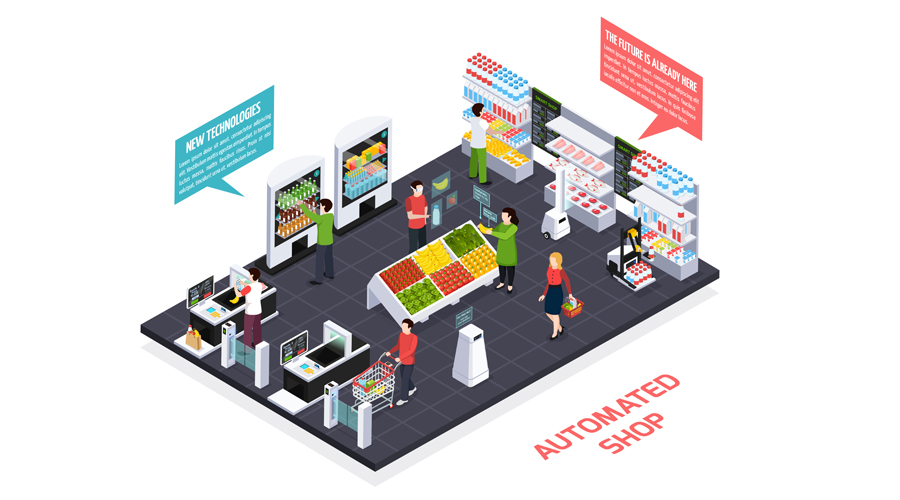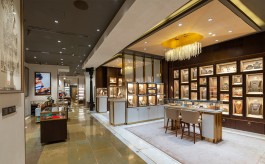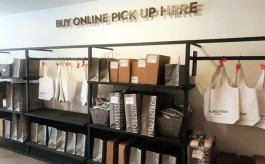Tech trends that transformed fashion retail
By Retail4Growth Team | January 08, 2020
Use of AI, ML and data analytics has increased which are being used in functions like BOPIS, Click & Collect, Self-Kiosk.

Indian fashion retail market is set to grow to the US $ 115 billion by 2027. However, understanding customers’ ever-changing demands and to speed up time to market have been arduous tasks even for a big apparel retailer, but the situation is taking a positive turn due to rise in technology use in fashion retail. The year 2019 proved to be a significantly good year when apparel retailers in India tried their hands out in 4.0 technologies to pace up with the rapidly changing retail landscape. Use of AI, ML and data analytics has increased which are being used in functions like BOPIS, Click & Collect, Self-Kiosk. Exciting in-store experiences, combating online shopping challenges, personalised shopping experience and better data-driven decisions are some of the benefits that the retailers have been able to deliver with the help of these technologies.
 AI-based personalised shopping experience and customer-centric merchandising
AI-based personalised shopping experience and customer-centric merchandising
Undoubtedly Artificial Intelligence (AI) has taken over the industries, be it in automotive, food or apparel; every industry has adopted the technology for better reasons. Indian fashion retail is also pacing up with the trend and a lot of technology providers have emerged over the years who are using AI and ML in their solutions. Forecasting future trends, identifying customer buying behaviour and fast fashion are the key factors contributing to the growth of AI adoption.
AI in the apparel industry has found its application in understanding the demand of the customers through the software. This is helping the retailers to target the right customers, with the right product and the right pricing at the right time. Stylumia and Vue are two leading technology providers in this segment in India which are using AI and ML to keep fashion retailers updated with their on-point trend forecast.
AI-based Chatbots are the new sales representatives being used by the retailers to handle customer queries and contact with customers. These are computer programs or artificial intelligence designed to convincingly simulate human conversation through messaging or chat - the most preferred ways of communication by Gen Z. Streamoid Technologies Pvt. Ltd is one such solutions provider whose AI-based chatbots named Stylebots assist in product discovery, styling advice and customer support. These allow customers to type and ask for a particular product, eliminating the hassle of applying filters, sliders, radio buttons and checkboxes making the product discovery much easier. The company witnessed exponential growth in 2019. ABOF is one of the big names in e-commerce retailing, using Stylebots.
Augmented Reality based Virtual Trial Rooms (Online and Offline)
The challenge for e-commerce was to provide an offline kind of experience where the customers could get the actual look of the garment. The problem of brands increased with high return rates due to sizing issues. While offline, the ease and comfort of online shopping with huge deals created a tough competition for them. Standing in the long queue of trial rooms and checkout counters were among a few challenges to be tackled. AR (Augmented Reality) came up with a solution to solve these problems which were manifesting every now and then.
In the start of 2019, Biba, the women's ethnic wear brand, collaborated with AstraFit, online fitting room service for fashion e-commerce. It introduced the AR tool to its online platform which allows the customers to try clothes virtually on the 3D models helping them to see the size and look of the garment.
Another tech company that has emerged strongly in this segment is TryNDBuy which is providing virtual trial rooms to the retailers. The company provides a technology that allows users to try clothes and acts as a virtual stylist suggesting the customers about the overall look.
POS and Self-Checkout Kiosk
POS has become a common system for the retailers and Indian companies are also using it more than ever. Being Human is one such brand that has a strong offline presence across the country and the brand has ensured it has a common POS across its stores including its franchise stores. In 2019, the band started working on the mobile POS concept and the same is scheduled to be rolled out soon.
Companies like Ginesys have extended full support for developing new-age POS technology. This year, Gurgaon-based fashion tech solution provider launched Mobile POS ZWING, a device which allows payments through anywhere in the store. The solution can replace the traditional checkout counters in the stores. The mobile POS is a small handy device just like the debit card machine which allows the shopkeeper to complete the customer shopping purchase through that.
‘Self- Checkout Kiosk’ is a system that allows customers to bill their merchandise and complete the payment transaction in a few simple steps on their own with almost negligible intervention from the store’s staff. This leads customers to not be a part of long queues as Self-Checkout Kiosk enables quicker checkouts. A leading fashion brand Lifestyle introduced the same in a few of its stores in 2019 and has been successfully running it.
A prominent e-commerce platform Myntra also opted for ‘Self- Checkout Kiosk’ in its newly launched fashion lifestyle RFID-enabled offline store ‘Roadster Go’ which allows customers to pick up apparel and accessories without any assistance from staff, discover real-time online prices and do a self-checkout in 30 seconds, eliminating the need to scan individual products or remove security tags from each garment.
Blockchain
Blockchain is a technology which is gaining ground strongly and the industry talked a lot about it in 2019. The most important benefit of using blockchain is that it allows the data to be more interoperable. This makes the data informational to be shared and be available with brands, manufacturers, suppliers and vendors. It also provides transparency. The use of this technology can help the manufacturers know if the product is original or fake. Blockchain helps in record keeping and provenance tracking as the product information can be traced through embedded sensors and RFID tags.
This further helps consumers as they are more aware and advanced than ever and they know about the unethical and environmentally harmful practices being conducted by their suppliers. It is impossible for companies to make sure that human rights are respected, working conditions are adequate and the environment is safeguarded without knowing where their products are made and that’s why transparency is essential. Blockchain even provides a detailed history about the product right from its origination to where it is presently.
In 2019, a tech start-up Infinichains started working on an organic cotton pilot study with Pratibha Syntex, India-based renowned apparel manufacturer, in a bid to trace a product from farm to garment and from garment to farm using its ‘credible’ software tool. According to Infinichains officials, the software is being built to allow the acquisition of cotton to be recorded and for the correct payments to be made.
About the author
Deepak Mohindra is the Chairman of Apparel Sourcing Week
Related Viewpoints
Chanda P Kumar
Chanda P Kumar, Associate Director- Marketing & Communications, Strategy , FRDC
Adding the right sparkle in jewellery store design









Comments